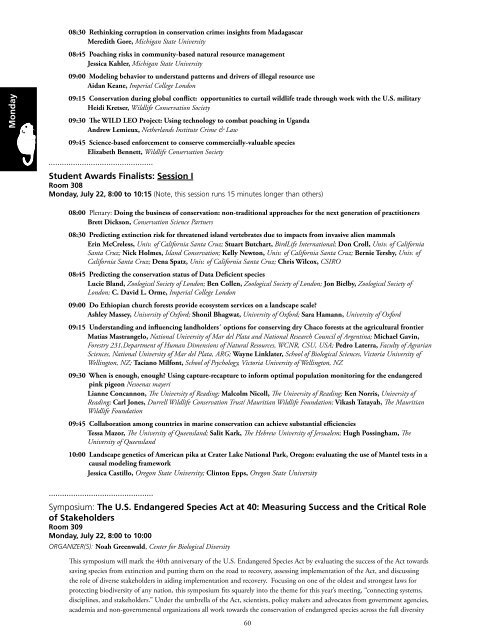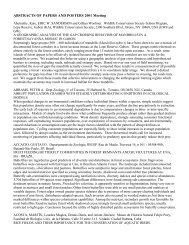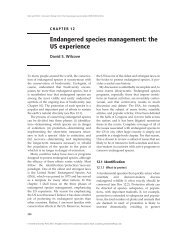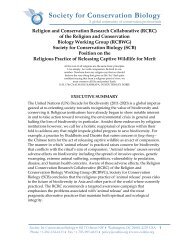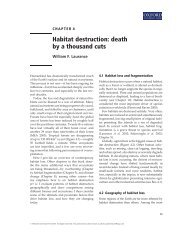ICCB 2013 Program - Society for Conservation Biology
ICCB 2013 Program - Society for Conservation Biology
ICCB 2013 Program - Society for Conservation Biology
Create successful ePaper yourself
Turn your PDF publications into a flip-book with our unique Google optimized e-Paper software.
08:30 Rethinking corruption in conservation crime: insights from Madagascar<br />
Meredith Gore, Michigan State University<br />
08:45 Poaching risks in community-based natural resource management<br />
Jessica Kahler, Michigan State University<br />
09:00 Modeling behavior to understand patterns and drivers of illegal resource use<br />
Aidan Keane, Imperial College London<br />
Monday<br />
09:15 <strong>Conservation</strong> during global conflict: opportunities to curtail wildlife trade through work with the U.S. military<br />
Heidi Kretser, Wildlife <strong>Conservation</strong> <strong>Society</strong><br />
09:30 The WILD LEO Project: Using technology to combat poaching in Uganda<br />
Andrew Lemieux, Netherlands Institute Crime & Law<br />
09:45 Science-based en<strong>for</strong>cement to conserve commercially-valuable species<br />
Elizabeth Bennett, Wildlife <strong>Conservation</strong> <strong>Society</strong><br />
...............................................<br />
Student Awards Finalists: Session I<br />
Room 308<br />
Monday, July 22, 8:00 to 10:15 (Note, this session runs 15 minutes longer than others)<br />
08:00 Plenary: Doing the business of conservation: non-traditional approaches <strong>for</strong> the next generation of practitioners<br />
Brett Dickson, <strong>Conservation</strong> Science Partners<br />
08:30 Predicting extinction risk <strong>for</strong> threatened island vertebrates due to impacts from invasive alien mammals<br />
Erin McCreless, Univ. of Cali<strong>for</strong>nia Santa Cruz; Stuart Butchart, BirdLife International; Don Croll, Univ. of Cali<strong>for</strong>nia<br />
Santa Cruz; Nick Holmes, Island <strong>Conservation</strong>; Kelly Newton, Univ. of Cali<strong>for</strong>nia Santa Cruz; Bernie Tershy, Univ. of<br />
Cali<strong>for</strong>nia Santa Cruz; Dena Spatz, Univ. of Cali<strong>for</strong>nia Santa Cruz; Chris Wilcox, CSIRO<br />
08:45 Predicting the conservation status of Data Deficient species<br />
Lucie Bland, Zoological <strong>Society</strong> of London; Ben Collen, Zoological <strong>Society</strong> of London; Jon Bielby, Zoological <strong>Society</strong> of<br />
London; C. David L. Orme, Imperial College London<br />
09:00 Do Ethiopian church <strong>for</strong>ests provide ecosystem services on a landscape scale<br />
Ashley Massey, University of Ox<strong>for</strong>d; Shonil Bhagwat, University of Ox<strong>for</strong>d; Sara Hamann, University of Ox<strong>for</strong>d<br />
09:15 Understanding and influencing landholders´ options <strong>for</strong> conserving dry Chaco <strong>for</strong>ests at the agricultural frontier<br />
Matias Mastrangelo, National University of Mar del Plata and National Research Council of Argentina; Michael Gavin,<br />
Forestry 231,Department of Human Dimensions of Natural Resources, WCNR, CSU, USA; Pedro Laterra, Faculty of Agrarian<br />
Sciences, National University of Mar del Plata, ARG; Wayne Linklater, School of Biological Sciences, Victoria University of<br />
Wellington, NZ; Taciano Milfont, School of Psychology, Victoria University of Wellington, NZ<br />
09:30 When is enough, enough Using capture-recapture to in<strong>for</strong>m optimal population monitoring <strong>for</strong> the endangered<br />
pink pigeon Nesoenas mayeri<br />
Lianne Concannon, The University of Reading; Malcolm Nicoll, The University of Reading; Ken Norris, University of<br />
Reading; Carl Jones, Durrell Wildlife <strong>Conservation</strong> Trust/ Mauritian Wildlife Foundation; Vikash Tatayah, The Mauritian<br />
Wildlife Foundation<br />
09:45 Collaboration among countries in marine conservation can achieve substantial efficiencies<br />
Tessa Mazor, The University of Queensland; Salit Kark, The Hebrew University of Jersualem; Hugh Possingham, The<br />
University of Queensland<br />
10:00 Landscape genetics of American pika at Crater Lake National Park, Oregon: evaluating the use of Mantel tests in a<br />
causal modeling framework<br />
Jessica Castillo, Oregon State University; Clinton Epps, Oregon State University<br />
...............................................<br />
Symposium: The U.S. Endangered Species Act at 40: Measuring Success and the Critical Role<br />
of Stakeholders<br />
Room 309<br />
Monday, July 22, 8:00 to 10:00<br />
Organizer(s): Noah Greenwald, Center <strong>for</strong> Biological Diversity<br />
This symposium will mark the 40th anniversary of the U.S. Endangered Species Act by evaluating the success of the Act towards<br />
saving species from extinction and putting them on the road to recovery, assessing implementation of the Act, and discussing<br />
the role of diverse stakeholders in aiding implementation and recovery. Focusing on one of the oldest and strongest laws <strong>for</strong><br />
protecting biodiversity of any nation, this symposium fits squarely into the theme <strong>for</strong> this year’s meeting, “connecting systems,<br />
disciplines, and stakeholders.” Under the umbrella of the Act, scientists, policy makers and advocates from government agencies,<br />
academia and non-governmental organizations all work towards the conservation of endangered species across the full diversity<br />
60


